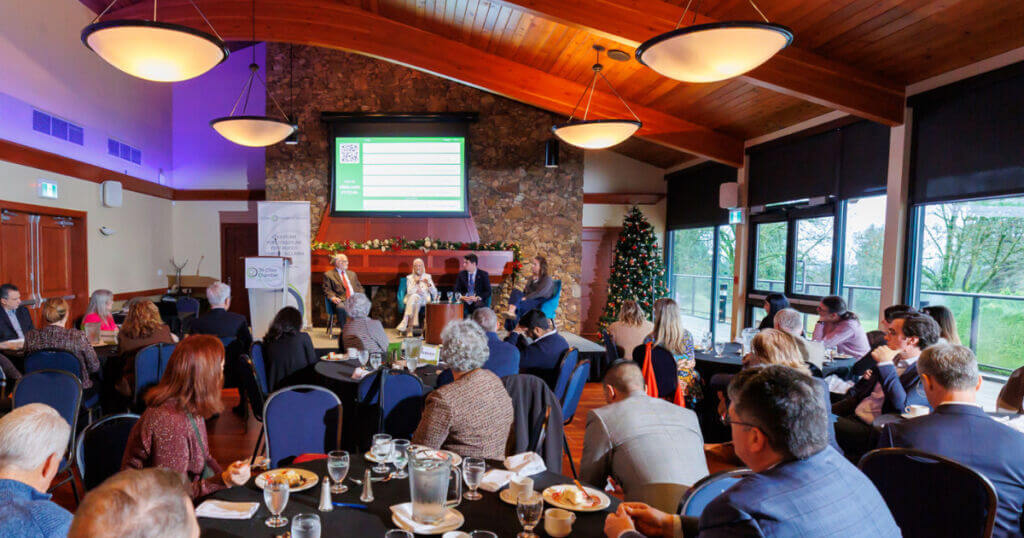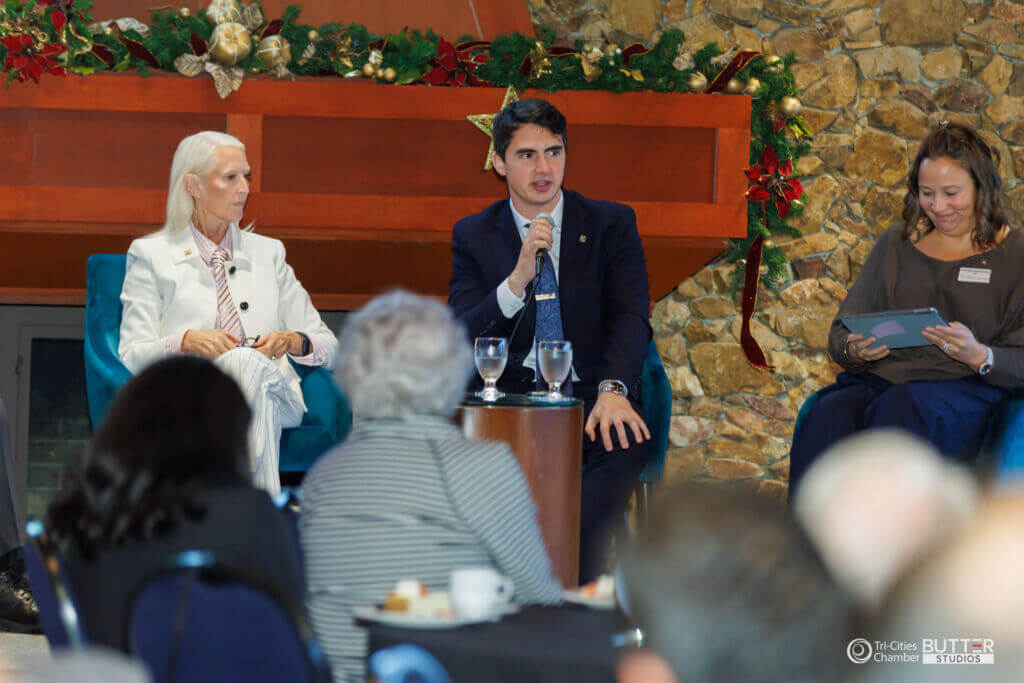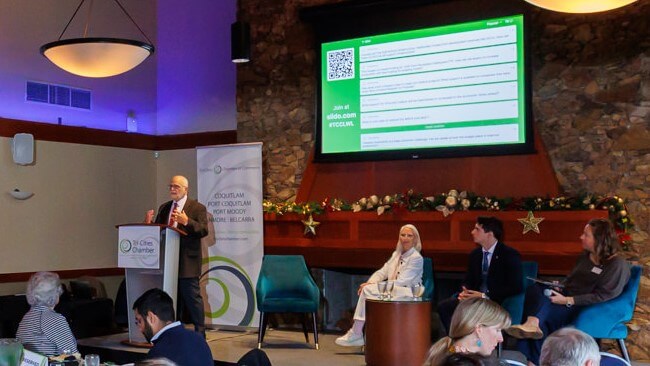
Coquitlam (November 13, 2025) The Tri-Cities Chamber of Commerce hosted a dynamic post-budget Q&A with Members of Parliament, bringing together business leaders, developers, transit representatives, ports, nonprofits, and entrepreneurs to unpack Budget 2025 and its impacts on our region. The discussion—rooted in real questions from the audience—highlighted clear priorities for the Tri-Cities: housing supply, transit funding, trade infrastructure, and support for small and growing businesses.
 Setting the Stage: Trade, Ports, and Regional Prosperity
Setting the Stage: Trade, Ports, and Regional Prosperity
The event opened with reflections on the critical role ports play in the national and regional economy. With a $5 billion Trade Diversification Fund, the $100 billion Roberts Bank Terminal 2 project, and $15 billion in federal infrastructure investments, ports remain drivers of jobs, supply chains, and community well-being.
The Chamber reiterated our long-standing partnership with regional ports, working together to strengthen trade corridors, regional connectivity, and sustainable long-term growth.
Budget 2025 also places emphasis on reducing internal trade barriers, improving regulatory efficiency, and expanding export opportunities—issues that directly affect the competitiveness of Tri-Cities businesses.
Housing: The Central Challenge—and Opportunity
Housing dominated the conversation, especially among developers, employers, and youth advocates. MPs highlighted the Build Canada Homes program, which aims to fund 100,000 units and prioritizes speed, volume, and the use of Canadian materials.
Developers at the event emphasized ongoing challenges: rising costs, municipal delays, labour shortages, and the need for stronger infrastructure support to match housing growth. Even with federal financing available for modular and prefabricated construction, building cannot accelerate without corresponding investments in roads, utilities, and transit.
Youth representatives underscored the urgency for affordability, linking housing stability to mental health, workforce retention, and long-term economic participation.
What the Chamber Wants to See Next (Housing):
- A unified national–provincial–municipal approach to dramatically shorten approval timelines and reduce layering of regulatory requirements.
- Targeted federal incentives for purpose-built rentals and missing-middle housing, ensuring long-term affordability.
- Continued support for modular, prefab, and innovative construction methods that speed up delivery and reduce costs.
- Infrastructure funding tied directly to areas of high housing potential, ensuring growth isn’t stalled by gaps in transportation, utilities, and services.
- Financing mechanisms that reflect real market conditions, helping developers navigate rising interest rates and construction costs.
Housing remains a foundational economic issue. For Tri-Cities businesses to recruit and retain talent, supply and affordability challenges must be addressed head-on.
Transit: The Region’s Mobility—and its Economic Backbone
Transit funding pressures emerged as one of the most pressing concerns. Attendees raised the federal government’s recent 20% reduction to transit allocations, noting the significant downstream effects on service delivery, system expansion, and the workforce who rely on transit daily.
Front-line workers, students, and employers in industrial and commercial zones are already experiencing the strain. With the Tri-Cities population growing faster than transit service levels, the gap is widening.
TransLink representatives and business leaders emphasized that predictable, long-term federal funding is essential to maintain and expand service, upgrade aging infrastructure, and support major rapid transit extensions.
What the Chamber Wants to See Next (Transit):
- Full restoration and expansion of federal transit funding, enabling TransLink to advance capital projects without interruption.
- Dedicated funding for service improvements across the Tri-Cities—especially in industrial zones where businesses depend on shift workers.
- Support for major rapid transit expansion, ensuring the region can accommodate population and employment growth.
- A national framework that ties housing growth to transit investment, recognizing that transit-oriented development reduces congestion and improves affordability.
- Clearer federal commitment to frontline worker mobility, supporting those who keep our economy running.
Transit is not just a transportation issue—it is an economic lifeline. Without adequate investment, the region’s ability to grow is at risk.
Small Business, Tech, and Cultural Industries: Additional Budget Highlights
Other key priorities discussed included:
- Support for SMEs, including loans up to $50,000, streamlined online financing, and accelerated approvals.
- Federal procurement opportunities for tech companies, with direct support from MPs and Canada Buys pathways.
- Increased funding for arts and culture—from community programs to national institutions—championed as a “good news story” for Canadian identity and creative industries.
- Opportunities for trade diversification, particularly in Africa, where participants urged stronger BC economic representation.
Moving Forward: The Chamber’s Advocacy Priorities
The Tri-Cities Chamber will continue to advance the following priorities with our federal partners:
- Accelerating housing approvals, infrastructure investment, and innovation for developers.
- Restoring and increasing federal transit funding to support TransLink and regional mobility.
- Strengthening trade corridors and port partnerships to drive long-term economic growth.
- Expanding support for small businesses, tech innovators, and cultural organizations.
- Pursuing new global trade opportunities, especially in emerging markets.
-30-
Since 1971, the Tri-Cities Chamber of Commerce has been the largest business association serving Coquitlam, Port Coquitlam, Port Moody, Anmore, and Belcarra, now representing 1,000+ organizations from every sector. The Chamber works to foster economic development, provide connections and benefits, and influence public policy at all levels of government to ensure strong business and strong communities. The Tri-Cities Chamber is an active member of the BC and Canadian Chambers of Commerce.
For more information, contact:
Jenifer McKinnon, Chief Executive Officer
Tri-Cities Chamber of Commerce
ceo@tricitieschamber.com
604.468.6870

 Setting the Stage: Trade, Ports, and Regional Prosperity
Setting the Stage: Trade, Ports, and Regional Prosperity